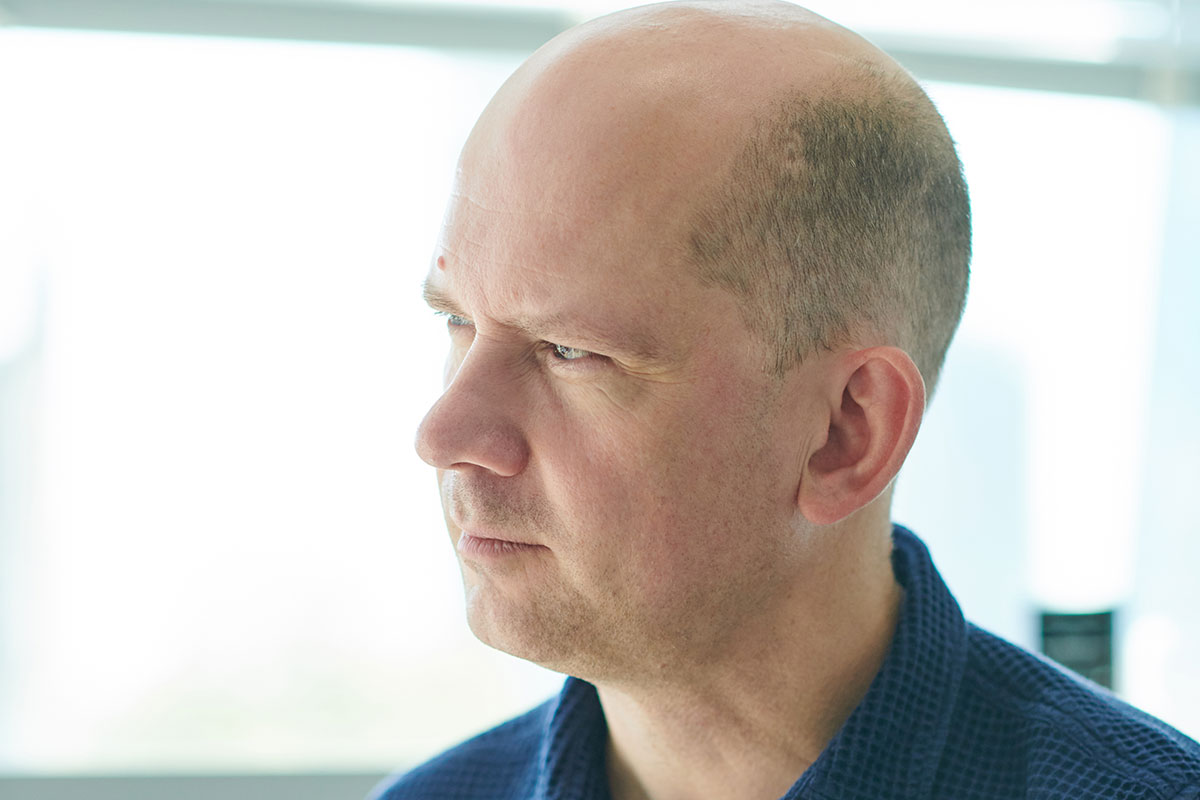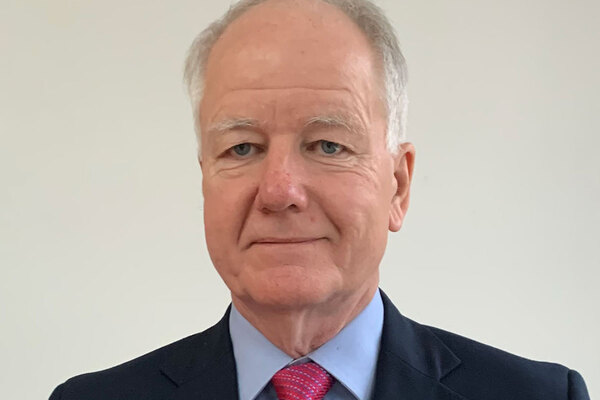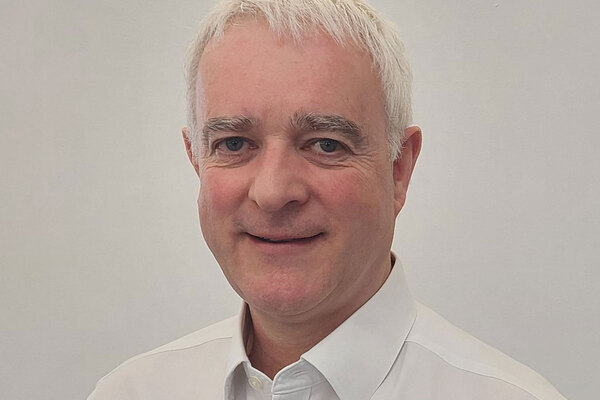You are viewing 1 of your 1 free articles
Interview with Peter Denton: the city boy
Luke Barratt meets Peter Denton, group finance director at Hyde, to talk about his switch to social housing after years of working in finance. Photography by Dan Joseph
In Greek mythology, the Trojan princess Cassandra was cursed to utter doom-laden but accurate prophecies that no one would believe.
Peter Denton, the new group finance director at large London housing association Hyde, may be feeling a little like Cassandra. The former banker, who has held senior roles at Deutsche Bank and Barclays, is preoccupied with the potential for a fresh financial crisis, and what it would mean for his business.
Under his guidance, the association last year completed a major £760m refinancing programme aimed at giving it more of a financial cushion in the event of such a downturn. And it is something he does not believe parts of the sector is taking seriously enough.
“Anecdotally, I hear a section of the sector that says, ‘Don’t worry, we’ll get bailed out.’ I hear another section that says, ‘We think we’re fine and have no worries at all – what are you talking about?’” Mr Denton, 47, says.
Fears over a crash should be more of a worry for the sector now than ever before. In the last downturn, most landlords built sub-market rented housing with government grant – a fairly recession-proof product. But in recent years, as we all know, large social landlords have become more and more exposed to the volatile open sales market as grant has retreated.
This exposure is only expected to increase in future, with credit ratings agency Moody’s predicting that turnover from market sale – currently accounting for 18% of the sector’s total income – will rise to 26% as soon as 2019.
“Rob Noel [chief executive of Land Securities] has been cautious in dialling down his exposure for years in anticipation of a crash. It hasn’t quite happened yet, but he’ll be right one day.”
“At some point you’re proven right,” he says. “Rob Noel [chief executive of Land Securities] has been cautious in dialling down his exposure for years in anticipation of a crash. It hasn’t quite happened yet, but he’ll be right one day.”
The Regulator of Social Housing (RSH) has repeatedly encouraged housing associations to embrace stress-testing in anticipation of such a crash, and will doubtless like the thrust of Mr Denton’s thinking.
Indeed, his position is far from unique among many other finance directors of larger associations, a point he acknowledges. Nonetheless, his caution did cause him to enact some changes when he arrived at Hyde in February 2017. The refinancing programme was one of his first moves, in preparation for the worst-case scenario.
“The base case was perfectly fine,” he explains. “It was making sure that we were as best supported as possible in a downturn. We had a structure of financing which was reflecting the world of the 1970s and ’80s, where we lived off grant, and failed to take any account of the appreciation of property in London over the decades after that.
"There was a change in philosophy to look at our performance and look at our real balance sheet position, and secondly start making sure that we were as prepared as possible for any downturn.”
“We had all this hidden value and we had a structure that was looking at our grant, which didn’t make much sense to me. There was a change in philosophy to look at our performance and look at our real balance sheet position, and secondly start making sure that we were as prepared as possible for any downturn.”
He believes his city background makes him more cautious about development risk. After starting out as an accountant, he quickly began to specialise in property finance, before moving into the world of banking.
One wall of his London Bridge office is made entirely from glass, and looks out over the steel and chrome skyline of the Square Mile. As he talks, Mr Denton points at the various parts of this landscape that bear his fingerprints.
“I ended up being a specialist in cross-border finance for Europe,” he relates. “I did a bit in Britain. Actually, I advised on the Gherkin. I helped build Heron Tower. I financed and worked on Tower 42 for 15 years. I had an early-stage involvement in the Axa tower that you can see the construction on now.”
The vast majority of his work, however, took place outside of the UK, which meant a period of living out of suitcases. “I was just living on a plane,” he confesses. “I used to travel two or three days a week, not just in Europe. We had investors in Korea, China and America etc, so you had to handle that.”
“I used to travel two or three days a week, not just in Europe. We had investors in Korea, China and America etc, so you had to handle that.”
While the world of social housing finance may be a little more prosaic, there are benefits when it comes to family life. Mr Denton’s wife is a partner at Magic Circle law firm Clifford Chance – an equally demanding job – and the pair have 10-year-old twins, a boy and a girl. Their drawings of dragons decorate Mr Denton’s office, alongside a map of London made in 1809.
In 2012, Mr Denton left the world of banking, having “had enough” of it in a post-crisis world; but he was not bound for social housing just yet.
His next move was to create a property investment business at Starwood Capital Group, the second-largest private equity firm for property in the world.
There, he created a real estate investment trust (REIT), a type of company that uses funds from the stock market to buy income-producing real estate.
Mr Denton recalls: “I started buying distressed loans in Spain and in Germany in particular. Loans that have defaulted, for banks, on property. Hotels in Spain… I had olive groves, I had ice cream factories. Warehouses, bit of resi. You name it, I had it.
“I had all these loans that the borrowers had defaulted on and the bank wanted to move the loans on. I bought a loan position on a hotel portfolio in Germany; we ended up taking ownership of the hotels and sold a few years later for a billion euros when it was all nicely sorted.”
It was after five years of this that he realised he wanted to move on, but at this stage he had only a vague ambition to work in the not-for-profit sector. Marrying this with his experience in property and a recent job opening at Hyde, however, made UK social housing the obvious choice.
Perhaps because of his history in the world of finance, Mr Denton is less attached to the traditional housing association model than some finance directors. He tells us he thinks the sector can afford to be less attached to owning everything it manages.
He’s enthusiastic, for example, about the prospect of managing some of the homes that new entrant to the sector Legal & General is planning to build, though he clarifies he has had no discussions with the institutional investor on that subject yet.
“We manage 6,000 properties for Islington at the moment,” he points out. “So why wouldn’t we do that for a third party?”
In the past couple of years, a growing class of small housing associations have been doing just that: striking deals with REITs like the one Mr Denton created, to manage homes – mostly specialist supported housing – that they do not own themselves.
Generally, these housing associations pay inflation-linked rents to the REITs, which include a number of large organisations that have targeted the sector in the past two years.
Recently, the RSH has turned its lens on this part of the sector, criticising one of these associations – First Priority – for a “fundamental failure of governance”, writing to similar organisations over fears of “conflicts of interest” and placing another of these associations – Inclusion Housing – on its ‘grading under review’ list.
"I have a very tough line on leases. Hyde will not take the new leases. Full stop."
Would Mr Denton ever consider doing a deal with a REIT? Or taking out some of the lease-based funding deals being offered widely to associations at the moment?
“No,” he says flatly. “I don’t mind going on record. I have a very tough line on leases. Hyde will not take the new leases. Full stop. I don’t see why I should credit-enhance a deal with my credit rating.
“That’s a pretty blunt position that permeates through this place… We don’t believe that sale-and-leasebacks are the right thing for housing associations. All you’re doing is converting operational cash flow into a certain income stream for investors. To me, that looks like almost a free lunch for investors.”
The 5% dividend sought by most of these REITs is, it seems, one of Mr Denton’s issues with the model. After going through the maths in detail, however, he adds: “Please make sure this isn’t reflected as me crapping on the REITs. It’s not in any sense. It’s simply saying that model isn’t for us. I can see the advantages of it, but for me the disadvantages outweigh that.”
“Please make sure this isn’t reflected as me crapping on the REITs."
Mr Denton, then, is not necessarily open to all the new models of working that are springing up in the sector, but he is still keen to explore non-traditional activities at Hyde, belying the pragmatism he shows in his attitude to planning for a possible crash.
He explains: “I’m actually not by nature a terrible pessimist. I just think that there’s a differential between a person and a role.
“And I think the role requires that – though you might objectively think that the set of circumstances you’re planning for are never going to occur – it’s incumbent on you to plan for that.”
Cassandra, then, he may be. But when another crash eventually does come, Mr Denton – and those who share his caution – could be vindicated.













